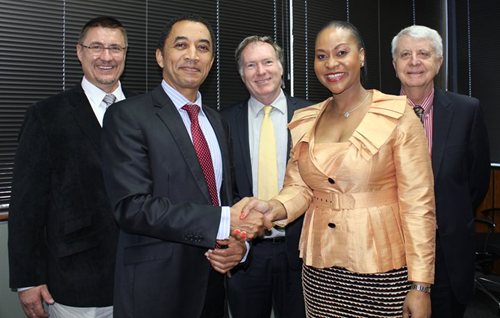
At the signing of the MoU between Nelson Mandela Metropolitan University and REDISA were NMMU Vice-Chancellor Prof Derrick Swartz (front from left) and REDISA Chairperson Thelma Mathamelo and (back) REDISA CEO Hermann Erdmann, Executive Dean of Science Prof Andrew Leitch and Kusaga Taka Consulting CEO Chris Crozier.
With a long-established successful reputation in rubber chemistry, the university was the immediate choice of REDISA, a private, non-profit waste management company selected by the government to conduct research and testing around the tyre industry - be they local or foreign tyre imports.
“We need a dedicated centre to assess the environmental rating impact of tyres from production through to destruction, as well as somewhere to research how we can make better use of materials from waste rubber. NMMU was the obvious choice,” says Piet Swart who heads up REDISA’s recycling division.
Apart from funding to establish the centre at NMMU, REDISA will also provide R8m a year for operating expenses for at least the next five years.This means the university will be seeking the services of new staff – a director for the centre and a chemistry professor to oversee the research for starters – and be able to offer a number of academically-deserving student’s bursaries.
“It’s a win-win situation for all concerned,” says Science Faculty Dean Professor Andrew Leitch at the signing of the Memorandum of Understanding (MoU) between the two key parties.
According to Mr Swart, an NMMU alumnus himself, the establishment of the centre – at a site yet to be decided at the university – will be something of a world-first.
“As yet, no such compulsory evaluation centre exists where all tyres manufactured in South Africa, and those imported into the country, are thoroughly tested. This will be a first in Africa and possibly globally,” said Mr Swart.
The other component of the MoU revolves around research, particularly in the how to recycle the materials from waste rubber into new materials. This will provide many opportunities for postgraduate research.